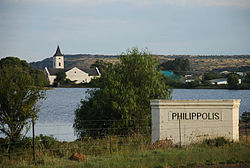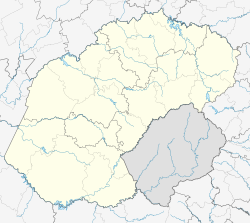Philippolis
| Philippolis | |
|---|---|

Philippolis
|
|
|
|
|
| Coordinates: 30°16′S 25°17′E / 30.267°S 25.283°ECoordinates: 30°16′S 25°17′E / 30.267°S 25.283°E | |
| Country | South Africa |
| Province | Free State |
| District | Xhariep |
| Municipality | Kopanong |
| Established | 1823 |
| Government | |
| • Type | Ward 4 |
| • Councillor | Nomvulazana Judith Stuurman |
| Area | |
| • Total | 39.6 km2 (15.3 sq mi) |
| Population (2011) | |
| • Total | 3,648 |
| • Density | 92/km2 (240/sq mi) |
| Racial makeup (2011) | |
| • Black African | 65.1% |
| • Coloured | 27.6% |
| • Indian/Asian | 0.5% |
| • White | 5.9% |
| • Other | 0.9% |
| First languages (2011) | |
| • Afrikaans | 41.2% |
| • Xhosa | 29.3% |
| • Sotho | 25.7% |
| • English | 1.3% |
| • Other | 2.3% |
| Postal code (street) | 9970 |
| PO box | 9970 |
| Area code | 051 |
Philippolis is a small town in the Free State province of South Africa. The writer and intellectual Sir Laurens van der Post was born here.
The London Missionary Society (LMS) founded Philippolis in 1823 as a mission station for the local Khoi people. The town takes its name from the LMS representative John Phillip. The early establishment makes it the oldest settlement in the Free State.
Adam Kok II, a Griqua leader, settled here with his people in 1826 and became the protector of the mission station. (Kok's son Adam Kok III and his followers later migrated across the Drakensberg mountains to settle in Kokstad in Griqualand East.)
The old church was replaced by a Dutch Reformed Church, which was consecrated in 1871. The pulpit, carved out of olive wood, has become a tourist attraction. The first school opened in 1873.
As of 2014[update], the town has started to become a popular tourist-destination because of its historical value, architecture and rural lifestyle.
The jail in the town was built in 1872 and served as a jail for the next 70 years. After this period it was converted into a police station, and several changes were made, like turning the cells into charge offices. The SANDF (South African National Defence Force) used the jail as an army barracks from 1972 to 1982. The jail was then abandoned from 1982 to 1998, when it was restored and turned into a bed and breakfast. During the time it was abandoned it was regularly used as a venue for the local secondary school's matric farewell party.
...
Wikipedia



